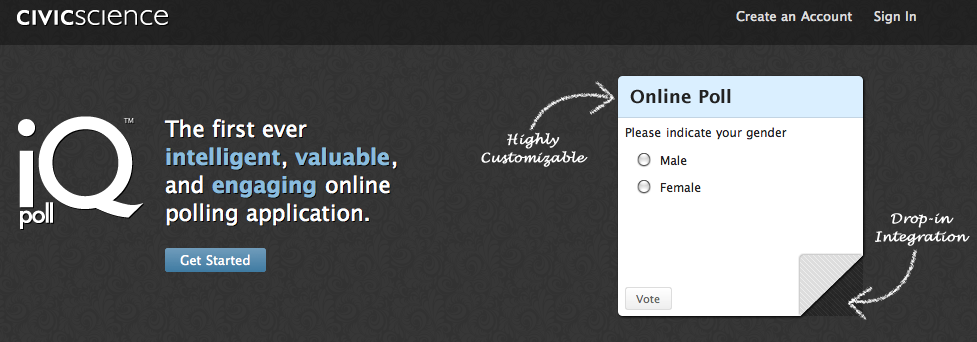Pittsburgh-based startup CivicScience, an intelligent polling utility that offers a host of audience measurement and analytics tools for publishers and advertisers, has raised $1.2 million in seed funding from a group of institutional and angel investors to expand its platform partnerships and automation technology as well as ramp up its hiring efforts.
The seed round’s investors include marketing research company, The NPD Group, national polling company ALR, and Kevin McClatchy, director of The McClatchy Company and former owner of the Pittsburgh Pirates. The seed round adds to the $1.6 million in funding the startup has already raised, bringing total investment to $2.8 million.
“Another polling startup?” you may ask in exasperation. Yes. (And personally, speaking non-objectively, my allegiance is with GoPollGo, the addictive and hilarious brainchild of former TechCrunch developer, Ben Schaechter.) But seeing as CivicScience is currently polling 11 million people per month and its software is being used by organizations like The International Brotherhood of Teamsters and The National Rifle Association, the startup shouldn’t be offhandedly dismissed. (Unless of course you want to be haunted by the ghost of Charlton Heston.)
Headquartered not far from Carnegie Mellon University, CivicScience has close ties to the top computer science school, as the software behind the service was developed by a team of engineering graduates and many of its staffers are alumni.
How does it work? CivicScience’s technology uses an API and customized widgets to plug into the types of polls commonly found on many third-party websites, social networks, and mobile platforms. This means that CivicScience polls integrate easily with those you may already be running on your site. Or, if you’re not currently on the polling bandwagon, the startup’s designers will build polls that match the look and feel of your site.
The technology can deliver up to three (owner-approved) poll questions to users each time they visit. It then uses impressive-sounding things like machine learning and predictive modeling algorithms to identify return users and collect statistics based on those visitors in order to build rich (but anonymous) profiles over time. Those profiles are broken down into categories and demographics and show brand and issue preferences — the stuff that’s valuable to marketers and ad wizard-types.
As the startup uses its technology to build a database of visitor data and poll responses, it also provides you with a custom dashboard containing tools for viewing, analyzing, and sharing this data with your sales team, advertisers — and even your mom.
CivicScience licenses its technology to publishers at no cost, so how does it make money? The startup’s business model is based on selling syndicated and custom research products from the data it collects from its partner sites. According to CivicScience CEO John Dick, a network of distribution partners then sell the aggregate data into retail, financial services, public affairs, and other verticals. If and when it uses your anonymous audience data in a paid report, he said, you get a revenue share. Pretty cool.
The startup initially targeted major newspaper websites, blog networks, and niche content sites with its technology, but with its new funding round, CivicScience plans to build on polling work it had already done for the Republican National Committee site, expanding to include brands, government agencies, political sites, educational institutions, and more.
The startup’s tech seems like it would be great for the many ad-supported sites out there, who, by nature, are all looking to get a better sense of who their customers are and what blows their hair back, so to speak. As long as the polls are designed well and aren’t springing onto unsuspecting visitors every other second — in other words, if they’re annoying — then this could be a nifty tool for your site.
Update: The CivicScience Team has provided me with this Onion-esque parody of their funding announcement. It’s hilarious and is required reading for everyone. Enjoy.
